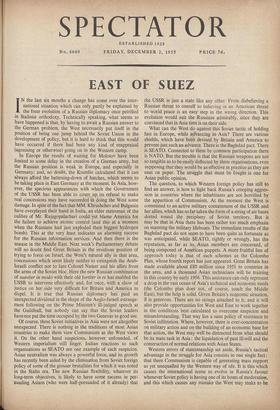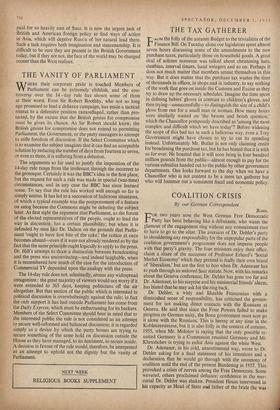EAST OF SUEZ
IN the last six months a change has come over the inter- national situation which can only partly be explained by the freer evolution of a Russian diplomacy once petrified in Stalinist orthodoxy. Technically speaking, what seems to have happened is that, by having to await a Russian answer to the German problem, the West necessarily put itself in the position of being one jump behind the Soviet Union in the development of policy, but it is hard to think that this would have occurred if there had been any kind of reappraisal (agonising or otherwise) going on in the Western camp.
In Europe the results of waiting for Molotov have been limited to some delay in the creation of a German army, but the Russian position is weak in Europe, and especially in Germany; and, no doubt, the Kremlin calculated that it can always afford the battening-down of hatches, which seems to be taking place in East Germany at the moment. In Asia, how- ever, the specious appearances with which the Government of the USSR has been able to cover up its refusal to make real concessions may have succeeded in doing the West some damage. In spite of the fact that MM. Khrushchev and Bulganin have overplayed their hand in India, an elder statesman of the calibre of Mr. Rajagopalachari could yet blame America for the failure to achieve atomic control (and this at a moment when the Russians had just exploded their biggest hydrogen bomb). This at the very least indicates an alarming success for the Russian information services. And then there is the unease in the Middle East. Next week's Parliamentary debate will no doubt find Great Britain in the invidious position of trying to force on Israel, the West's natural ally in that area, concessions which seem likely neither to extinguish the Arab- Israeli conflict nor to lure Colonel Nasser and his allies from the arms of the Soviet bloc. Here the new Russian combination of suaviter in modo with their old fortiter in re has enabled the USSR to intervene effectively and, for once, with a show of justice on her ,side very difficult for Britain and America to dispel. It is true that Russian diplomacy has paid an unexpected dividend in the shape of the Anglo-Israeli estrange- ment following on the Prime Minister's ill-judged speech at the Guildhall, but nobody can say that the Soviet leaders have not put the time occupied by the two Genevas to good use.
Of course, these Soviet initiatives in Asia were not altogether unexpected. There is nothing in the traditions of most Asian countries to make them view Communism as the West views it. On the other hand suspicions, however unfounded, of Western imperialism still linger. Indian reactions to such organisations as SEATO are one example of such suspicion. Asian neutralism was always a powerful force, and its growth has recently been aided by the elimination from Soviet foreign policy of some of the grosser brutalities for which it was, noted in the Stalin era. The new Russian flexibility, whatever its long-term objectives, is likely to have some success in per- suading Asians (who were half-persuaded of it already) that the USSR is just a state like any other. From disbelieving a Russian threat to oneself to believing in an American threat to world peace is an easy step in the wrong direction. This evolution would suit the Russians admirably, since they are convinced that in Asia time is on their side.
What can the West do against this Soviet tactic of holding fast in Europe, while advancing in Asia? There are various shields, which have been devised by Britain and America to prevent just such an advance. There is the Baghdad pact. There is SEATO. Connected to them by common participation there is NATO. But the trouble is that the Russian weapons are not so tangible as to be easily deflected by these organisations, even supposing that they would be as effective in practice as they are neat on paper. The struggle that must be fought is one for Asian public opinion.
The question, to which Western foreign policy has still to find an answer, is how to fight back Russia's creeping aggres- sion in countries where the inhabitants are not horrified by the apparition of Communism. At the moment the West is committed to an active military containment of the USSR and her allies, which has so far taken the form of a string of air bases dotted round the periphery of Soviet territory. But it may be that in Asia there has been rather too much emphasis on manning the military lifeboats. The immediate results of the Baghdad pact do not seem to have been quite as fortunate as was anticipated, while SEATO, rightly or wrongly, has the reputation, as far as its Asian members are concerned, of being composed of American puppets. A more fruitful line of approach today is that of such schemes as the Colombo Plan, whose fourth report has just appeared. Great Britain has made available about £80 million since 1951 to countries in the area, and a thousand Asian technicians will be training in this country by early 1956. This assistance can only represent a drop in the vast ocean of Asia's technical and economic needs (the Colombo plan does not, of course, touch the Middle East), but the help is solid. Given Britain's economic situation, it is generous. There are no strings attached to it; and it will also provide opportunities for West and East to work together in the conditions best calculated to overcome suspicion and misunderstanding. That way lies a sane policy of resistance to Soviet infiltration. Where, however, there is over-concentration on military action and on the building of an economic base for that action, the West may well be distracted from what should be its main task in Asia : the liquidation of past and the construction of normal relations with Asian States.
Western errors of statesmanship set aside, Russia's tactical advantage in the struggle for Asia consists in one single fact: that there Communism is capable of generating mass support as yet unequalled by the Western way of life. It is this which causes the international scene to evolve in Russia's favour whenever Soviet policy is having one of its bouts of moderation, and this which causes any mistake the West may make to be paid for so heavily east of Suez. It is now the urgent task of • British and American foreign policy to find ways of action in Asia, which will deprive Russia of her natural lead there. Such a task requires both imagination and statesmanship. It is difficult to be sure they are present in the British Government today, but if they are not, the face of the world may be changed sooner than the West realises.



































 Previous page
Previous page